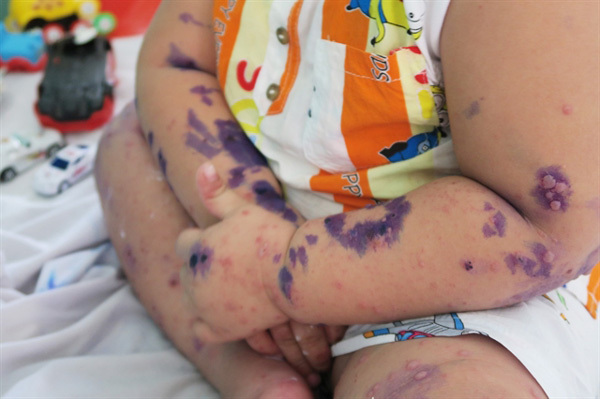 |
| Rashes with blisters on hands and feet are symptoms of the hand, foot, and mouth disease. — VNA/VNS Photo Dinh Hang |
Its surveillance system for contagious diseases found there were 6,573 cases last month, with nearly 16 per cent requiring hospitalisation.
At the Children's Hospital No 1, 50 patients were admitted every day compared to less than 20 in August.
The Children's Hospital No 2 admitted 235 patients in the first half of last month. It has a dedicated ward for the disease.
The centre has warned parents and caregivers to keep their children at home if they contract the disease to prevent its spread, especially through schools.
After an epidemic occurred in 2011-12, the HCM City's Department of Health has been regularly carrying out preventive measures against the disease at kindergartens and schools in co-ordination with the Department of Education and Training.
In August, it strengthened these measures.
According to the World Health Organisation Western Pacific Region (WPRO), this common viral disease is transmitted between children when infected ones touch objects and surfaces which are then touched by others.
Infants and children under 10 mainly contract the disease, which is caused by a group of enteroviruses, including coxsackie A16 and enterovirus 71 (EV71), and symptoms include fever, painful sores in the mouth and rashes with blisters on the hands, feet and buttocks.
“However, not everyone who is infected has symptoms, and at times mouth sores or skin rash may be the only symptoms,” the WPRO said.
“The disease is usually mild, and nearly all patients recover fully in seven to 10 days without medical treatment.
Although complications are uncommon, the disease caused by EV71 can manifest severely in children and has been associated with meningitis and encephalitis, and sometimes death.”
Health experts said no specific antiviral drugs or vaccines are available against the enteroviruses causing the disease.
Children are at risk of infection often because of poor hygiene practices, they said.
Effective preventive measures include frequent hand washing with soap and water, cleaning contaminated surfaces and soiled items like toys first with soap and water and then using a dilute solution of chlorine-containing bleach to disinfect them, and avoiding close contact with patients with the disease. VNS
 Hand, foot and mouth disease is reaching its peak season in HCM City, with incidence doubling last month from August, according to the city Preventive Medicine Centre.
Hand, foot and mouth disease is reaching its peak season in HCM City, with incidence doubling last month from August, according to the city Preventive Medicine Centre.